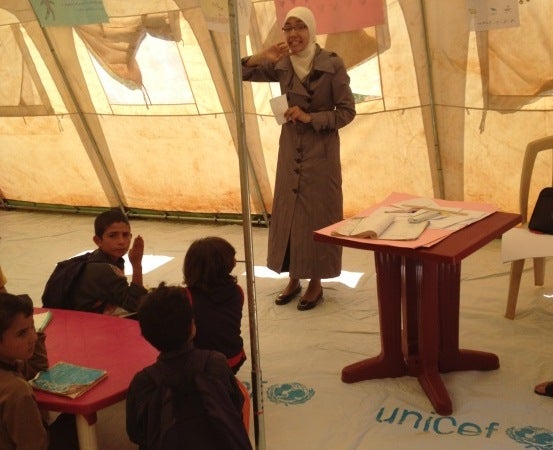
in a non-formal setting to Syrian refugee students
near Zahle, Lebanon, June 2014
Photo: Noah Yarrow
The setting was also particular: a classroom in a tent in an informal settlement not far from the Syrian border, lacking blackboards or electricity, where students were learning. Lebanon has taken in more Syrian refugees than any other country—well over a million so far. Lebanon currently provides education services for approximately 165,000 Syrian refugees, some in informal classrooms like this one. The Ministry of Education has recently drafted the “Reaching All Children with Education in Lebanon” strategy which highlights specific areas of great need. Increased financial support to Lebanon is required to ensure that all children, both Lebanese and Syrians, have access to basic services, including quality education.
In a public school in Zahle district, students gathered for their lesson in the afternoon. Some of the public schools are so full that they have opened their doors for an afternoon shift, providing an accelerated program for students who have missed out due to dislocation to catch up. The secondary schools rarely have an afternoon shift, since the bulk of Syrian refugees enrolled are at the primary level. As the kids grow older and are able to work, short-term economic necessity tends to trump long term need to invest in human capital.
The current approach to education of refugees in Lebanon includes a mixture of delivery systems, including public school-based services for the majority of enrolled refugee students, private schools for those who can afford them, and NGOs using rented buildings or tent facilities. The international community has provided resources through UNICEF and UNHCR, though these are insufficient to meet the needs of the sector. The new Reaching All Children with Education in Lebanon strategy calls for closer links to the formal education system and improved quality of services for all students. Without system-wide strengthening measures, there is a real risk of decreased quality and access to education services for all students in the public system, both Lebanese and Syrian.
It is not known how long the children and their families will remain, but it is clear that without increased financial support from the international community, an entire generation of children is at risk of losing out. A current World Bank project helps support the Ministry of Education and Higher Education to continue to improve the quality of education services and system management, but the stresses of the rapid increase in the population of students served in such a short period of time is taking a toll. More assistance in the form of grants is urgently needed to provide quality education for all children in Lebanon.


Join the Conversation